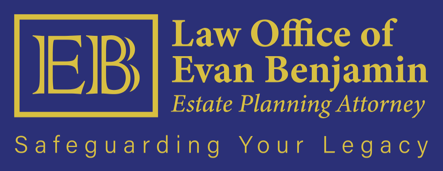Probate & Trust Administration
Whether your loved one died leaving a Last Will & Testament, a Revocable or Irrevocable Trust, or without leaving either a Will or Trust, we at the Law Office of Evan Benjamin are experienced in handling the administration of all of these types of estates. We consistently amaze our clients at how efficiently we handle the entire estate administration process to a successful conclusion.
Get A Free Consultation
What is a Probate?
Probate is the legal process through which a deceased person’s will is validated, and their assets are distributed according to their wishes. It involves proving the validity of the will, identifying and valuing the deceased person’s assets, paying any debts and taxes, and distributing the remaining assets to the rightful beneficiaries. The probate process can be time-consuming, expensive, and public, which is why many people seek to avoid it.
Creating a trust can be an effective way to bypass probate. A trust is a legal, fiduciary arrangement among a grantor, trustee, and beneficiary. It provides for the ownership, management, and distribution of assets where the trustee holds the assets for the grantor for the benefit of a third party, called a beneficiary. The grantor gives up his or her ownership of the assets that are to be transferred to a trust, and the trustee holds and manages them according to the conditions stipulated in a trust deed.
Establishing a trust ensures that the assets you worked hard for are protected and can be preserved for your loved ones or other individuals or organizations you wish to benefit. Unlike a will, a trust is a private document, thus avoiding the often-expensive and public probate process. However, not all trusts are created equal.
There are two main types of trusts: the revocable trust and the irrevocable trust. Before deciding which type of trust best suits your situation, you must first consider how much control you want or need to retain over your assets. Keep in mind that you reap fewer immediate benefits when you exercise more control over your assets. Surrendering control allows you to enjoy greater potential benefits down the line.
What is a Trust
A trust is a legal, fiduciary arrangement among a grantor, trustee, and beneficiary. It provides for the ownership, management, and distribution of assets where the trustee holds the assets for the grantor for the benefit of a third party, called a beneficiary. The grantor gives up his or her ownership of the assets that are to be transferred to a trust, and the trustee holds and manages them according to the conditions stipulated in a trust deed.
Creating a trust can be an effective way to bypass probate. Probate is the legal process through which a deceased person’s will is validated, and their assets are distributed according to their wishes. It involves proving the validity of the will, identifying and valuing the deceased person’s assets, paying any debts and taxes, and distributing the remaining assets to the rightful beneficiaries. The probate process can be time-consuming, expensive, and public, which is why many people seek to avoid it.
Establishing a trust ensures that the assets you worked hard for are protected and can be preserved for your loved ones or other individuals or organizations you wish to benefit. Unlike a will, a trust is a private document, thus avoiding the often-expensive and public probate process. However, not all trusts are created equal.
There are two main types of trusts: the revocable trust and the irrevocable trust. Before deciding which type of trust best suits your situation, you must first consider how much control you want or need to retain over your assets. Keep in mind that you reap fewer immediate benefits when you exercise more control over your assets. Surrendering control allows you to enjoy greater potential benefits down the line.
What is the Difference?
A trust and probate are two different mechanisms for managing and distributing a person’s assets after their death.
Trust
- Private arrangement: A trust is a legal, fiduciary arrangement among a grantor, trustee, and beneficiary. It provides for the ownership, management, and distribution of assets, with the trustee holding the assets for the grantor for the benefit of a third party, called a beneficiary.
- Avoids probate: Assets held in a trust do not go through the probate process. This can save time and money, and keep the distribution of assets private.
- Control: The grantor can specify how and when the assets are to be distributed, giving them more control over their assets even after death.
- Types: There are two main types of trusts: revocable trusts (which can be altered or revoked by the grantor) and irrevocable trusts (which cannot be changed once established).
Probate
- Court-supervised process: Probate is the legal process through which a deceased person’s will is validated and their assets are distributed according to their wishes. It involves proving the validity of the will, identifying and valuing assets, paying debts and taxes, and distributing the remaining assets to the rightful beneficiaries.
- Public record: Probate proceedings are public, meaning that the details of the deceased person’s assets and their distribution are accessible to anyone.
- Time-consuming and expensive: The probate process can take several months to years to complete, and it can be costly due to court fees, legal fees, and other expenses.
Key Differences
- Privacy: A trust is a private arrangement, while probate is a public process.
- Control: A trust allows the grantor to control how and when assets are distributed, while probate follows the terms of the will or state law.
- Process: Assets in a trust avoid probate, while assets not in a trust must go through the probate process.
- Cost and time: Trusts can save time and money by avoiding the probate process, which can be lengthy and expensive.
In summary, a trust can provide greater control, privacy, and efficiency in managing and distributing assets, while probate is a court-supervised process that can be time-consuming, costly, and public.
Get In Touch For a Free Consultation




